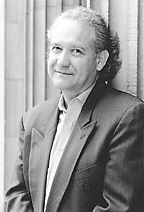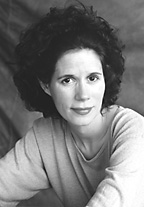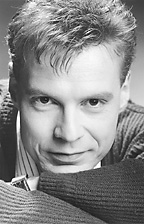Is There a Life after Scales? by Dominique Olivier
/ November 1, 1999
Version française...
If you have spent two thirds of your life practising an instrument alone in a cubicle fortified only by the thought
that one day you might become a professional musician, renouncing this dream constitutes a defeat as well as an
existential rupture. The constant daily effort made by apprentice musicians over long years can never be
underestimated. If for the most part they don't have the title of doctor, these interpreters nonetheless have devoted
more time in the pursuit of excellence in their field than has any medical practitioner. To use a worn out formula,
many are called, few are chosen. Whether it be because of persistent tendinitis, nodes on the vocal cords,
underdeveloped talent, or financial difficulties, many musicians move on to other things despite solid training.
Their intense self-imposed musical discipline means that they work in a structured, organised manner and don't
turn up their noses at the tasks to be accomplished. The qualified musician often possesses qualities relevant to the
world of those who are not sonic creators.
What, in fact, can musicians who leave university with a diploma do if they don't pursue a career as
instrumentalists? For starters, the system which supports the production of concerts is an industry onto itself.
Fund raisers, organisers and distributors are often ''defrocked'' musicians. People who organize concerts, or
work for organisations such as Jeunesses musicales, come from music faculties. Announcers on musical
programmes on the Chaîne culturelle de Radio-Canada are for the most part musicians, and so are producers,
researchers and reporters. Various aspects of CD production need people competent in music, particularly when it
comes to recording. McGill offers a course in sound engineering.
With some training in musicology, one can earn one's living by writing, doing research or teaching. Some
ex-musicians make a living as copyists, creating sheet music from recent scores. And what about those who
program Radio Classique and Galaxie? Musicians, of course. As one sees, there is no lack of openings in an
industry which generates considerable economic activity.
The portraits which follow show that many go far, helped by their musical training. Chance, determination,
passion, imagination and talent come into play, pointing certain careers in surprising directions.
Musicologist Jean-Jacques Nattiez
 Jean-Jacques Nattiez of the Université de Montréal, one of North America's major musicologists, feels that a
blend of music and politics is the starting point of his work. Nattiez, born in Amiens in 1945, belongs to the
generation that came of age just prior to the Events May 68. "We students were all Marxists in those days," he
recounts, "and this led us to choose subjects related to our political involvement." Jean-Jacques Nattiez of the Université de Montréal, one of North America's major musicologists, feels that a
blend of music and politics is the starting point of his work. Nattiez, born in Amiens in 1945, belongs to the
generation that came of age just prior to the Events May 68. "We students were all Marxists in those days," he
recounts, "and this led us to choose subjects related to our political involvement."
Music was an all-embracing feature of Nattiez's youth. His musical studies included ear training, theory, piano,
and clarinet (and a stint as a stagehand at Bayreuth when he was 16!), and his father was a music critic. When the
question of whether art should be politically involved became a heated debate in France, the young Nattiez realized
that music had been ignored in this issue. "That was when I asked myself whether music could have a political
and ideological content. Is music a language, I wondered? And what was language, exactly? So I studied
linguistics because of music." The future musicologist found that linguistics provided models for musical
analysis. This led him to develop a method based on his language studies, and eventually to become a pioneer in
the field of musical semiology. "I had no plans to be a musicologist," he admits. "However, theory was my best
subject when I was a ten-year-old at the conservatory - I always got 10 out of 10!"
Nattiez settled in Quebec in 1970 and has been a member of the U. de M. music faculty since 1972. Since that
time his career as a musicologist has flourished. His interests have ranged widely - from Richard Wagner to Pierre
Boulez, the Inuits, and African music, to name a few. You can read more about Nattiez's passionate pilgrimage in
life in his recent book, La musique, la recherche et la vie : Un dialogue et quelque dérives, published this year
by Leméac.
Michel Duchesneau, general manager of Société de musique contemporaine du Québec
Oboist and musicologist Michel Duchesneau had planned a career as a university teacher, but fate deemed
otherwise. After doctoral studies at Laval University and a post-doctorate at the Sorbonne, he published
L'avant-garde musicale à Paris de 1871 à 1939 (Mardaga 1997), based on his research to date. He continued to
explore the subject in a second post-doctorate, begun in 1996, but at this point he was offered the SMCQ post,
which he accepted. The appointment was based on Duchesneau's knowledge of the factors involved in an
organization devoted to avant-garde music, rather than on his administrative background.
"I knew I'd be pretty comfortable in this role and that I'd be able to continue with my research," he says. "It
wasn`t a complete break with what I'd been doing. I was very involved with the avant-garde milieu and my
studies had made me familiar with the administrative aspect. From the practical point of view I changed direction,
but theoretically I was still in the same bailiwick, so to speak. The basic problems never change."
Michel Duchesneau's job can be described in a few words, although in actual fact it is fairly complex. "I've been
entrusted with a system geared to produce concerts. The program is decided by the members of an artistic
committee, and they tell me, 'Okay, Michel, you have to make it work - it's up to you to see that the concert
happens!'" As an administrator, Duchesneau makes no secret of his frustration at the SMCQ's relative lack of
understanding of the theatrical arts, but all things considered, he says he feels very happy when he sees the results
of his work on stage.
Catherine Perrin, musician and radio host
 Catherine Perrin has a double career as a musician and a tv and radio broadcaster. After studying harpsichord in
Quebec City, Montreal, and LaHaye (Holland), she went on to get a degree in communications at UQAM
(Université du Québec à Montréal). Today she hosts a daily radio arts show, Concert et compagnie, for
Radio-Canada as well as doing a weekly stint on the tv show De bouche à oreille. At the same time she has
continued her career as a harpsichordist (having introduced several contemporary works to the public) and as a
member of the chamber ensemble I Musici de Montréal. Catherine Perrin has a double career as a musician and a tv and radio broadcaster. After studying harpsichord in
Quebec City, Montreal, and LaHaye (Holland), she went on to get a degree in communications at UQAM
(Université du Québec à Montréal). Today she hosts a daily radio arts show, Concert et compagnie, for
Radio-Canada as well as doing a weekly stint on the tv show De bouche à oreille. At the same time she has
continued her career as a harpsichordist (having introduced several contemporary works to the public) and as a
member of the chamber ensemble I Musici de Montréal.
How did she get into radio? "It's always fascinated me," she told us. "I worked for a community radio station in
Quebec City when I was a teenager. However, it was after I came back from Europe that I realized that preparing a
small chamber music concert required 25 hours of rehearsal. We were paid $150, and to boot I had to carry the
harpsichord up a staircase myself! That's when I decided I'd better find an alternative way of using my music to
earn a good living."
She auditioned for Radio-Canada while she was studying for her communications degree and was hired as an
understudy. She began doing arts reporting as well, and finally got her own show. After ten relatively stable years
at Radio-Canada, Perrin has had to take stock of her two lines of work. "For some years I've been aware that I am
putting quality ahead of quantity in my work. But if I weren't playing the harpsichord I'm not sure I could remain
enthusiastic about talking about music to my audience. On the other hand, when I get home after a day of listening
to music and meeting the people who make it, I'm really anxious to sit down at my harpsichord!"
Jean-François Lapointe, light opera baritone
By Anne-Catherine Hatton
 Baritone Jean-François Lapointe knew from a very young age that his professional life would centre around lyric
theatre. Given his type of voice and personal preferences, he was naturally drawn to French operetta and light
opera repertoire. The problem was that this repertoire is something of a poor cousin in North American music,
offering little chance of earning a respectable income. As a singer at the outset of his career, the question for
Lapointe was not what to do, but how to do it. He decided to try his chances in Europe and at the age of 22
entered the Paris International Singing Competition, emerging with three prizes. Baritone Jean-François Lapointe knew from a very young age that his professional life would centre around lyric
theatre. Given his type of voice and personal preferences, he was naturally drawn to French operetta and light
opera repertoire. The problem was that this repertoire is something of a poor cousin in North American music,
offering little chance of earning a respectable income. As a singer at the outset of his career, the question for
Lapointe was not what to do, but how to do it. He decided to try his chances in Europe and at the age of 22
entered the Paris International Singing Competition, emerging with three prizes.
Competition for contracts is fierce in France, however. First you must convince a Parisian agent to have faith in
you - something that takes perseverance, diplomacy, and resourcefulness - in order to get those first private
auditions that are the key to concrete offers. "It's not enough to have talent," says Lapointe. "Personal contact is
crucial." It was after meeting British director Peter Brook that he got his first role as Pelléas in a major European
tour in 1993. It proved to be a watershed year for Lapointe, who had just returned from Copenhagen. He has
sung in Monaco, Vienna, Bordeaux, Toronto, Cincinnati, and Japan, all the while remaining very active in
Quebec, which is still his home base.
We asked him what advice he would give young artists. The first thing to do is evaluate your strengths and
weaknesses so as not to make any false starts, says Lapointe. "You get to know your potential by singing as much
as possible, whether it's in a church or a shopping centre." The next step is to acquire a range of skills. All lyric
artists should know how to move, dance, fence, and convey emotional expression. "It's too late to learn these
things two days before the dress rehearsal," he points out. Don't sit around waiting for the phone to ring, he
counsels. "Even though I have an excellent agent at the moment, I'm always racking my brains for possibilities
and trying to make things happen."
[Translation: Jane Brierley &Tom Levitt]
Version française... |
|


